Mink River
27/04/15 19:43
Brian Doyle, Mink River: A Novel, (Corvallis, OR: Oregon State University Press.), 2010
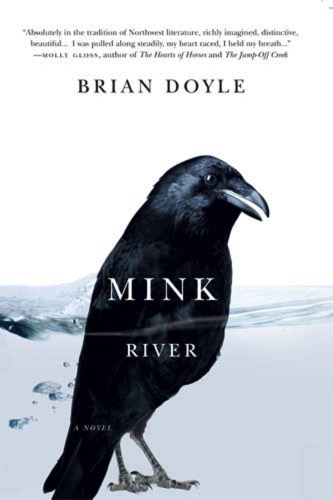
Of course we know it is a novel. The talking crow has far too much capacity for independent thought. Crows are smart, but one has to marvel at the creativity of the mind that can make a talking crow who suffers a disability as a result of an accident and becomes a credible character. I'm still now sure how Doyle makes it work, but it does work.
This book is a wonderful story that is so well told that I was tempted to pick it up and read it again as soon as I finished. I don't say that about many novels. It was a complete treat.
David and Goliath
27/04/15 19:30
Malcolm Gladwell, David and Goliath: Underdogs, Misfits, and the Art of Battling Giants, (New York: Little Brown & Co.), 2013
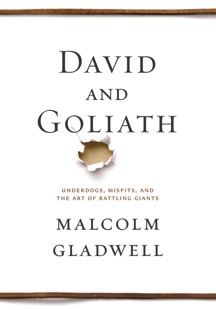
My image of the magazine wasn't helped by Gladwell's book. Malcolm Gladwell is a staff writer for the New Yorker and his book has the flavor of a hurriedly written research paper by an undergraduate student. He mistakes anecdote for evidence, misinterprets statistics, and fails to even consider multiple sources. I suppose I'd probably rate the effort worth a C for a grade: not failing, but hardly exceptional.
The premise is reasonable. What we know about the sources of success is often incomplete. Obstacles and disadvantages can lead to growth of character, integrity and maturity.
The biggest problem with the book is that Gladwell isn't an underdog. He fails to see his position of exceptional privilege. He isn't a civil rights leader - he doesn't even know what it means to have his rights denied. He isn't a student trapped in an unsuccessful classroom. By writing about the challenges of underdogs from a position of personal privilege, Gladwell comes off as preachy and overbearing. The book is little more than his opinion and his opinion seems not to be well founded.
If you want to read the book, I recommend against purchasing it. I'm glad to give away my copy and I suspect there are a lot of others who have the book who would be willing to do the same.
And, by the way, I have no plans to subscribe to The New Yorker.
Blue Horses: Poems
27/04/15 19:05
Mary Oliver: Blue Horses: Poems, (New York: Penguin Press.), 2014
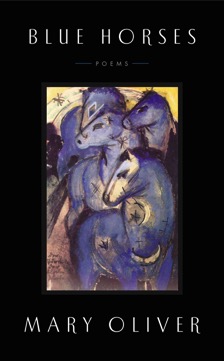
"Yes, by the heavens, if I wanted a boat I would want a boat I couldn't steer." I know you have to read the whole poem for this simple line to come as a "zinger" at the end that gets you laughing.
this is a book to savor and delight and put down and pick up again and read again - the kind of book that finds a home on the headboard of my bed.
Perhaps the Pulitzer prize judges aren't as stuffy as I imagine.
The Pale King
27/04/15 18:55
David Foster Wallace, The Pale King: An Unfinished Novel, (New York: Little Brown & Co.), 2011
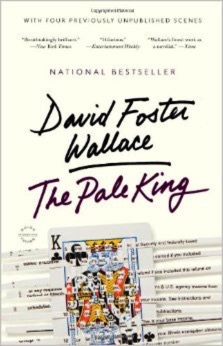
What it seems to me is to be a great course in fiction writing. Because the manuscript is raw and unedited, you get to see Wallace's writing style and how he allows himself to follow tangents and not get too hung up on the overall integrity or theme of the book. Like the sliced up playing card on the cover, the book seems to be a collection of many stories where you can tell that an image is emerging. You even know what the image is. Yet it is obvious that it isn't a single image, but a collection of fragments that seem to hang together.
Other reviews of this book encouraged me to read it. I'm glad I did. I doubt I would have done so without the positive reviews.
You might say it is a strange introduction to David Foster Wallace's writing. On the other hand it may well be his masterpiece, unfinished as it is. I'm not sure that you need a great ending to have a great story. Perhaps the best stories of our lives give us the sense that we might craft the ending in our own imagination.
I know I'll be reading more of Wallace's books in the future.
It Spooks
27/04/15 17:27
John Caputo and respondents, It Spooks, (Rapid City, SD: Shelter 50 Publishing, 2015)
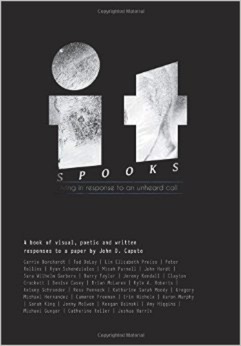
Part of the joy of the book is the intellectual stimulation of philosophical ideas without any arguments that even come close to threatening my core beliefs. Part of the joy is the striking visual presentation. Ideas that are far from black and white presented in a black and white format make for a poetic impression. Unlike many anthologies, each contributor is introduced to us in a very clever format that gets us to engage the contributors more deeply.
Another joy of the book is the delightful contribution, near the end of the book, by Catherine Keller, who responds in the form of a letter to John Caputo with responses, questions and comments on differences and gaps in Caputo's logic. The effect of making these two essays the bookends of the collection of essays is to give the overall impression of being in the midst of an ongoing conversation. It is my hunch that there could easily be a second volume - perhaps a volume of conversations between Caputo and Keller.